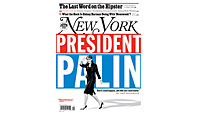
1. John Heilemann’s predictions for how (with an assist from Michael Bloomberg) Sarah Palin could become the next commander-in-chief (“2012: How Sarah Barracuda Becomes President,” November 1) had Washington wonks especially riled up. “As far-fetched as it seems, Heilemann makes a decent case,” wrote Steve Kornacki on Salon’s War Room blog. “Palin, after all, has been acting more and more like a candidate this year. As Heilemann notes, she seems to have the bug—and rational concerns about protecting her brand may not matter much to her.” Others were less convinced. “Covering the world of politics requires having a fertile imagination. But Heilemann takes this skill to an extreme,” argued Jonathan Capehart at the Washington Post’s PostPartisan blog. “Palin shows neither the inclination nor the desire to do the hard work needed to run and lead the most important enterprise on the planet. And other potential Republican candidates are not just going to sit back and let her take the nomination.” “[Heilemann] assumes that Republicans put enough stock in Palin to nominate her in the first place,” added Dorian Davis at the Daily Caller. “Palin is to Republicans what the U.S. invasion of Iraq is to Democrats: She had no right to be here in the first place, and her presence has been a disaster.” “The real point here is that the third-party fantasy is irrelevant. If there’s a double-dip recession and unemployment is over 10 percent, then odds are good that any GOP nominee would win,” opined Jonathan Bernstein on a blog at The New Republic. “Yes, Palin is very unpopular right now. But if she does manage to [win the nomination], we’re not talking about today’s Palin anymore. Republicans would rally around her.” Mayor Bloomberg’s hypothetical presidential run came under scrutiny as well. “It’s a fascinating speculation,” noted Clive Crook online at The Atlantic. “If we got to the point where Bloomberg did decide to run, Obama continued to make his case mainly to the Democratic base, and Palin continued to seem clueless on substance, I bet Bloomberg would win. I wonder if Heilemann buried the lede.” “I’m completely unconvinced,” wrote Ross Douthat on his blog at the New York Times. “How many northeastern progressives would contemplate casting a vote for a third-party candidate knowing that it might deliver the White House to the woman they fear and loathe above all others? To have any chance of being a major factor in the 2012 race, Bloomberg would need the Republicans to nominate a candidate who makes a large swath of voters uneasy but doesn’t actively terrify anybody.” Palin herself took a moment to reflect on the cover’s semantics on Entertainment Tonight. “Oh,” she said, reading the cover line aloud, “ ‘How it could happen and who you could blame.’ That’s about right!”

2. Mark Greif’s anthropological postmortem of the “hipster” phenomenon (“What Was the Hipster?,” November 1) sparked a furious online fusillade between hipster defenders and oppugners. “Sorry that you weren’t invited to the party.” “Great article with loud, ringing truths that are making people very uncomfortable.” “The assumption that Vice’s audience=McEggers’s audience is a huge fallacy. Didn’t know they made brushes that broad.” “Suffers from the same surface-skipping cultural ignorance as it accuses hipsters of.” “I think it’s safe to assume that everyone who has negative things to say about this article is a hipster.” “I don’t see what’s so hard about this. If you have a 30-inch waist and are dramatically long of leg, skinny jeans function simply as pants that fucking fit.” “I think the writer overstates the white roots, ’cause I sure saw a lot of Asian hipsters early on, and some black ones, too. But the description is about perfect.” “Our predisposition is to more or less agree with an idea Greif dismisses about halfway through, which is if you care at all about ‘the hipster,’ whoever he or she is, you probably are one.” “The dance parties will live on.”
3. Readers generally admired Steve Fishman’s profile of nonagenarian Newsweek owner Sidney Harman, but felt the prospects for Harman’s new magazine were not encouraging (“Newsboy,” November 1). “Fishman does a great job dissecting the deal,” said Professor Rob Laurich at CUNY’s Madlibrarian blog. “A great look into the saga,” added Politico’s On Media blog. “Some of the most interesting reporting focuses on how Harman lost his first choice of editors.” “As a whole, the article helps make sense of the embattled magazine’s new owner, his late-stage jump into media, and his approach to his new property’s financial woes,” wrote Nate Freeman at the Observer’s Media Mob blog. “Perhaps 92 isn’t the new 40 after all.”
Send correspondence to [email protected].